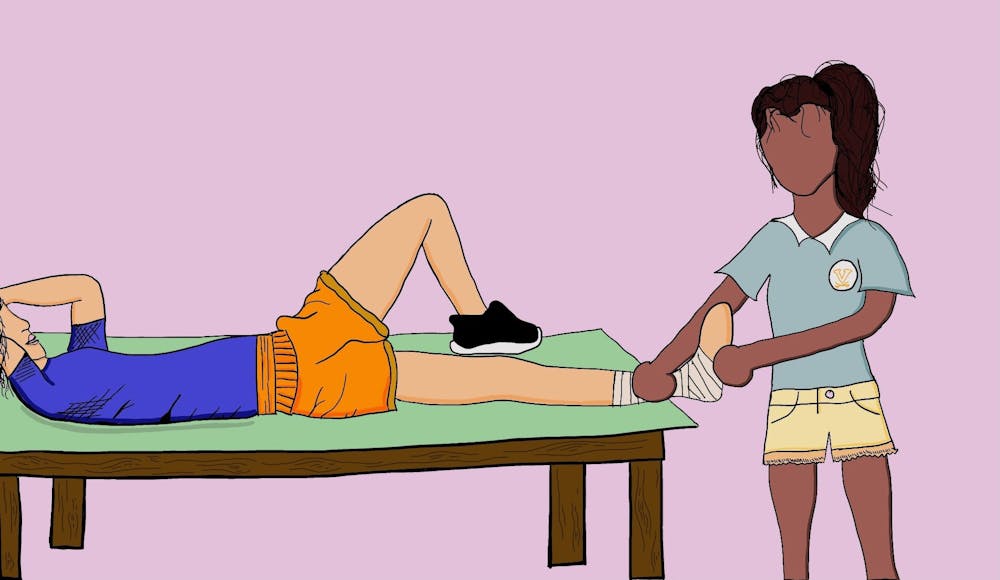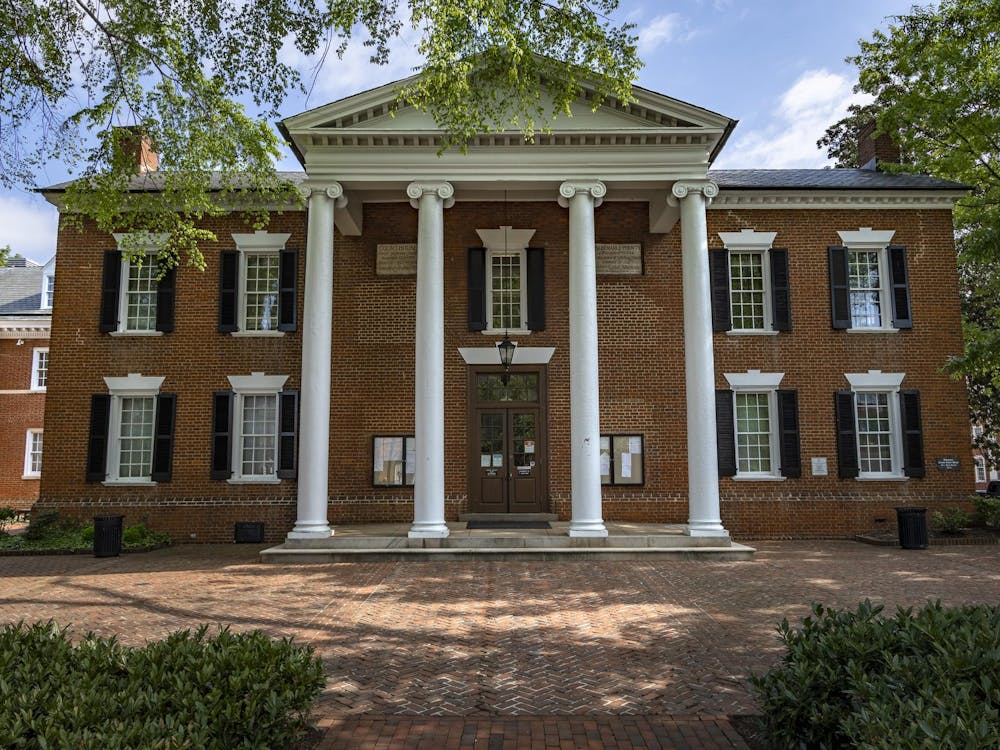中文版请点击此处
In the spring of 2019, then-sophomore swimmer Paige Madden was all set to compete in the World University Games in July, having finished the season with an ACC Championship in the 800-meter freestyle relay, All-America honors across five events and a second place finish in the 500-meter freestyle at the NCAA Championship.
“It was two months out from the World University Games, which I had qualified for the year prior and so I was looking forward to that for a whole year,” Madden said. “It was in Italy, which is really exciting and a chance to compete internationally.”
Nonetheless, catastrophe struck as she fell down a set of stairs and woke up the next morning with sharp pain in her knee. Madden found herself unable to practice, let alone kick in the water.
“Based off of Google alone I kind of like knew what it was, but it wasn’t until I went with my trainer into the doctors [and] got an MRI … when they called me to confirm the diagnosis,” Madden said.
The diagnosis was a meniscal tear, which with rehabilitation can take up to three to six months to recover from according to the American Academy of Orthopedic Surgeons — potentially sidelining her from her trip to Naples. However, prior to her surgery, doctors informed Madden of a second option — a meniscal debridement or meniscectomy — to remove the damaged tissue and shorten her recovery time to only six weeks.
Madden was also told that she wouldn’t know what surgery was performed — and if she’d have a chance to swim at the World University Games — until after the surgery.
“I was really anxious about the surgery and the outcome when I woke up,” Madden said. “So actually when I woke up that was my first question, I asked which procedure they did and luckily it was the [meniscectomy].”
However, when it comes to major injuries like a meniscal tear, it doesn’t just become a question of if athletes are able to return to walking and swimming leisurely, but one of if they can return to a high level of competition. Stephen Brockmeier — one of Virginia Athletics’ three team orthopedic surgeons — understands this intricacy, having worked with Virginia student-athletes for over 10 years.
“The stakes are a little bit higher for a high level athlete, because their needs, their goals, their long-term outlook is certainly going to be kind of higher, frankly for some of these athletes than some of us weekend warriors,” Brockmeier said. “[While] it’s important to every patient, the injuries and the management of these injuries … from the standpoint of this being their livelihood or their career or something they’re pursuing in that regard, [that] may not [always] be the case.
For Madden, being able to return to her ACC-winning form meant a six-week grueling rehabilitation process where she would spend upwards of two to three hours in treatment, forcing her to drop a summer volunteer commitment.
“It was pretty much eat, sleep, swim, rehab,” Madden said.
For the first week of rehab, Madden wasn’t able to get into the pool because the stitches in her knee could have become infected. Even once she started to swim again, she could only pull with her arms for a week, before starting to kick lightly. Guiding her through the process was one of U.Va. Sports Medicine’s athletic trainers, who provide consistent care for athletes involved in rehabilitation and injury prevention.
“Athletic trainers are able to stay involved in the athletes' care by seeing them on a regular basis,” said Andrea Fortunati, assistant athletic trainer for swim and dive. “We work with the athletes during rehab and treatments to better prepare for training, and monitor their progress as they increase their volume and training time.”
Beyond swimming in the pool with restrictions, Madden also worked on balance training in order to restore strength in her injured knee. A self-proclaimed poor balancer, Madden was often frustrated with that component of rehab and felt the process took not just a physical toll, but also a mental toll on her.
“I’m not very good at balancing to begin with and there’d be points where I’d just get really frustrated, and my trainer had to remind me ‘you have to stay positive, it’s not worth your energy to worry’ which is hard for me sometimes,” Madden said.
Beyond athletic trainers and the athletes themselves, there is a similar understanding among physicians that physical injury elicits both physical and mental challenges for student-athletes.
“The mental health component of [injury] is oftentimes every bit as significant as the physical component,” Brockmeier said. “When you look at an injury, it’s not a knee, it’s a person … and these are people who are very used to performing at a high level.”
Furthermore, particularly for high-achieving athletes like Madden who know what it feels like to be at the pinnacle of their sport, it can be tough to grapple with sitting on the sidelines and being unable to contribute to the team.
After devoting countless hours towards rehab for six weeks, Madden was given the all-clear to rejoin her teammates and swim at full speed just two weeks prior to the World University Games. The abbreviated time at full speed didn’t slow Madden in the slightest, however, as she won a team gold as a part of the 4x200-meter freestyle relay squad and a silver in the 200-meter freestyle.
Despite the impediments the time away from swimming threw at Madden, she recognized the newfound perspective it gave her on the sport.
“I think we get caught up with ourselves a lot because practice is hard, it’s grueling physically and mentally, but when that gets taken away from you ... it allows you to take a step back and really appreciate what you’re missing,” Madden said.
Following the World University Games, Madden had a strong 2020 season. She notched five ACC titles — three individual and two relay — and ACC Swimmer of the Year honors, all while battling chronic synovitis in her shoulder at points in the season. Madden’s experiences with injury — the meniscus tear and aforementioned synovitis — helped her recognize the importance of understanding her limits.
“For me personally I kind of know if too much is too much … so I know if [my shoulder pain is] coming on, and I’ll go and talk to [my trainer] and get treatment for it,” Madden said. “It’s really just [about] knowing my limits.”
Throughout the 2021 season, managing chronic pain has been a fruitful endeavor for the now-senior, as Madden once again secured five gold medals at the ACC Championship and was named ACC Swimmer of the Year for a second straight year.
The Mobile, Ala. native now looks towards the NCAA Championship later this month, where she hopes to lead No. 2 Virginia women’s swim and dive to their first-ever national championship. Further down the road are the U.S. Olympic Trials in mid-June, where Madden and fellow teammate sophomore Kate Douglass are strong candidates to qualify for the Tokyo Olympics this July.
While Madden’s successes — especially in the face of injury — may come as a surprise to the casual fan, it’s rather a reflection of the remarkable resilience Brockmeier witnesses on a daily basis while working with student-athletes.
“I never cease to be amazed by the level of character and the level of determination and really just the level of time commitment associated with our student athletes here at U.Va.,” Brockmeier said. “It’s really an amazing group of individuals.”
Madden and the Cavaliers kick off their pursuit for a national championship Wednesday at the Greensboro Aquatic Center in Greensboro, N.C. All events will be broadcast live on ESPN3.







